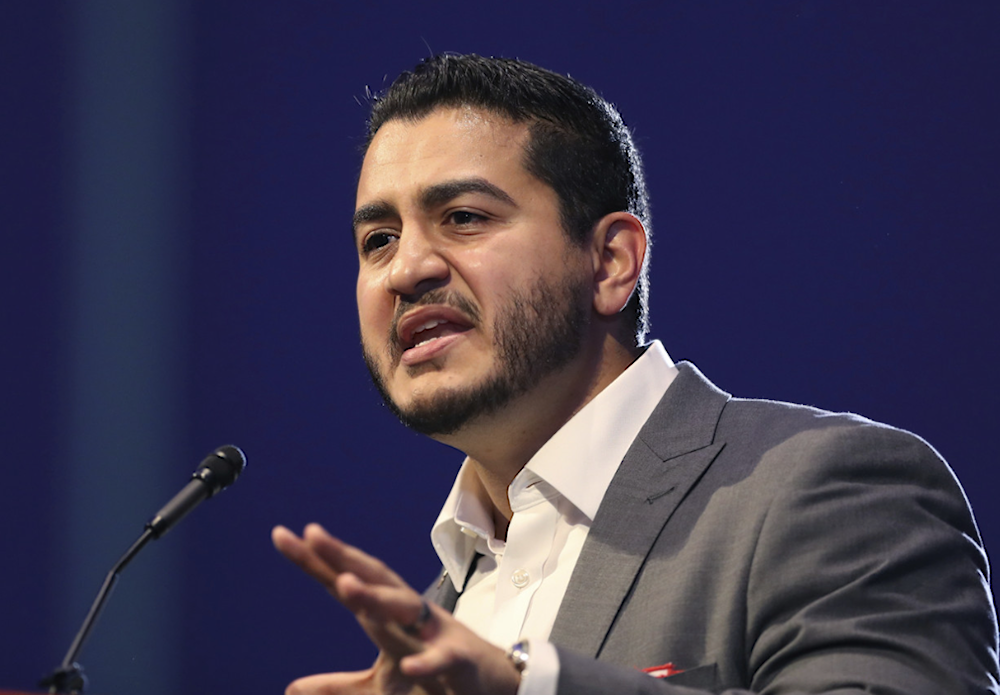Michigan's primary fight could redefine Democratic Party: POLITICO
Michigan's Senate primary is shaping up to be a defining showdown between progressives and moderates — a test of where the Democratic Party is headed and how united it can stay in a high-stakes election year.
-
 Abdul El-Sayed addresses supporters during a rally, Sunday, Aug. 5, 2018, in Detroit. (AP)
Abdul El-Sayed addresses supporters during a rally, Sunday, Aug. 5, 2018, in Detroit. (AP)
Michigan is shaping up to be the state where the left takes a strong position, providing the clearest test yet of the Democratic Party's orientation, POLITICO reported.
Before Abdul El-Sayed declared his candidacy, state Sen. Mallory McMorrow, a leftist Democrat, jumped into the race, criticizing the "same old crap out of Washington" and announcing she would not support Senate Minority Leader Chuck Schumer.
Meanwhile, moderate Democratic Rep. Haley Stevens is set to announce her Senate bid as early as next week. She is phoning Democrats to encourage them to run for her House seat, according to two Michigan Democrats who have been briefed on the calls and have asked to remain anonymous.
It's sparked a debate between progressives and moderates on everything from the economic and foreign policy message to who should head the party. And the outcome of the important battleground primary will affect national Democrats' rhetoric in 2026, as well as the presidential race two years later.
El-Sayed criticized certain candidates as lacking depth, while State Rep. Emily Dievendorf frames the race as a test of the left's willingness to show courage and advocate for average Americans.
There are fault lines even on the party's left side, and the Michigan primary might help determine how aggressively Democrats across the ideological spectrum pursue older members of their own party. El-Sayed and Stevens are backing Schumer, but McMorrow has stated she will dismiss him over his handling of a Republican-backed government funding measure.
The state is "at the center of this conversation," said state Representative Laurie Pohutsky, a progressive. "We're going to continue being a focal point when it comes to that debate, and I think that we are also in a position to kind of reach a sort of consensus about what we need right now in terms of moving the Democratic Party forward."
However, the fought primary, as well as the obvious ideological schisms, have some strategists concerned that the intra-party conflict would harm whatever candidate advances to the general election. The fight to succeed retiring Democratic Sen. Gary Peters is a major priority for Republicans in a state that Donald Trump narrowly won last year. Senate Majority Leader John Thune and National Republican Senatorial Committee Chair Tim Scott both backed former Rep. Mike Rogers' campaign shortly after it debuted this week.
Caitlin Legacki, a Democratic campaign veteran, believes "the Michigan Senate seat is imminently winnable, but if the primary challengers decide to turn this into a proxy fight among the party's most online factions, we are cooked."
In an interview, El-Sayed, who has been harshly critical of "Israel's" war on Gaza, enraging some centrist Democrats, downplayed the race's national significance.
"I think Bernie's endorsing in this race because he sees the opportunity to empower somebody who wants to join him in the Senate to make sure that we've got a politics that works for working people," he previously told Politico.
Sanders has had limited success getting statewide endorsements in Michigan in the past. After endorsing El-Sayed for governor in 2018, Gretchen Whitmer, a more moderate Democrat running on the slogan 'repair the damn roads,' defeated him in all 83 counties.
Stevens' supporters believe El-Sayed and McMorrow are on the same progressive path. In reaction, she is likely to "Michiganize" the election rather than nationalize it, according to an associated strategist who requested anonymity to discuss her approach.
Even in sketching out that campaign strategy, the strategist signaled a slap to the progressive left.
“It’s a focus on Michigan, Michigan’s auto industry, and manufacturing jobs versus a national conversation about progressive leadership and Democratic punditry,” the strategist believes.

 4 Min Read
4 Min Read










